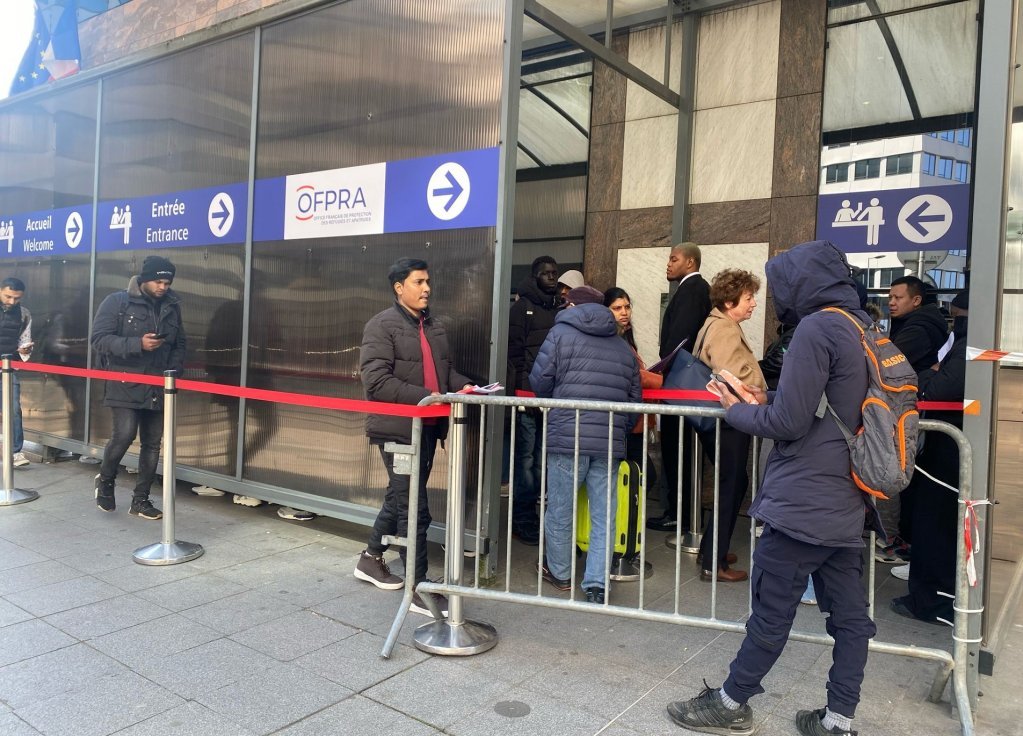Migrants seeking protection in the Val-d’Oise department north of Paris must report to a "France asylum" service within the prefecture prior to their interview with the Ofpra, the public body responsible for processing asylum claims. Associations and syndicates are up in arms about the new procedure. InfoMigrants explains why.
Asylum-seekers who arrive in France for the first time and live in the Val-d’Oise department, north of Paris, are now required to report to a new service called "France asylum" within the Cergy-Pontoise prefecture. The pilot project, foreseen under the 2024 immigration law and otherwise known as the Darmanin law, will later be tested in the cities of Metz and Toulouse.
What is the 'France asylum' service?
In the 'France asylum' service in Cergy, migrants, in order to be successively registered must pass through three different offices or services. First they register at the prefecture, then at the French Office of Immigration and Integration (OFII) and finally at the French Office for the Protection of Refugees and Stateless Persons (OFPRA).
In concrete terms, migrants first have their fingerprints collected by an official at the prefecture, next they are attributed with material basics (housing, financial help) by officers representing OFII, and finally, they file their asylum request with a representative at OFPRA.
An interview at the OFPRA's headquarters is foreseen later on in the process.
Read Also
French Senate votes to exclude associations from migrant detention centers
What has changed?
The procedure differs from other French departments. Usually, OFPRA is independent of the prefecture, the two structures never collaborate.
Asylum seekers must first report to the prefecture – through a specific office called Single-desk contact point for asylum seekers (GUDA). The latter reunites the services of the prefecture and the OFII. By the end of these interviews, the agents don’t ask the concerned person to present themselves to an OFPRA agent – no representatives from this office are present at the prefecture. Migrants then receive an asylum file which they will fill out within 21 days before submitting it to the OFPRA.

This 21-day interval matters. During these three weeks, asylum seekers have the time to write their story of exile (to introduce their request) and explain their motives. They can be assisted by the social workers or interpreters present in the housing centers to help them write in French.
This stage is very important, because when they are summoned to the OFPRA offices, the protection officer will retrace the transcribed declarations in the file of their asylum request.
Everything is accelerated in the context of the new "France asylum" service. Just after their meeting with an agent from the prefecture, the foreigner will meet the same day with a member of the OFPRA. Their request will be recorded by the agent – without the delay of 21 days. "The OFPRA agent will collect all the elements of the asylum seeker’s civil status as well as the essential elements of their story," said the agency to InfoMigrants. In other words, asylum seekers are required to share their story immediately, with the help of an interpreter over the phone if necessary.
What is shocking about it?
This new system "triggers numerous concerns," said several associations, including NGOs working with migrants like La Cimade and le Gisti, in a report released at the end of May.
Activists fear the elimination of the 21-day delay will be detrimental for migrants. During the meeting with an OFPRA agent in the "France asylum" service, "the person can, at this stage, have difficulties responding to the questions in a structured and precise manner without ever having been prepared," say the associations.
Unions representing employees at OFPRA agree, and protested this measure at the beginning of 2024 with a number of strikes. "This isn’t the right time to tell a story. How can one formulate a traumatic event in these conditions? People are in a stressful situation and find themselves face-to-face with an official unaccustomed to hearing these types of accounts because they haven’t been educated in this domain, unlike protection officers," said Jean-Charles Lallemand, co-secretary general of the CGT OFPRA, when contacted by InfoMigrants.
But spokespeople for the agency itself said the criticism was unfounded. They said asylum seekers can finish their story within 21 days by sending an email to this address: recit@ofpra.com
Read AlsoWhat happens during an Ofpra interview in France?
Modifications possible?
OFPRA insisted that the initial elements communicated to the "France asylum" service are not definitive and can be modified during the interview at the OFPRA headquarters.
"We fear that the additions won’t be considered or that the asylum seeker should justify themselves for not having spoken of a reason for leaving," said Lallemand. "What prevails is orality. It is already the case today and it won’t change."
OFPRA responded to questions from InfoMigrants about this fear, saying that any modification included during the second interview will be considered.
The associations also believe the presence of the OFPRA within the prefecture carries with it a risk of "confusion" and an erosion of independence. "This location, integrated into the prefecture, [can] legitimately [be] perceived as an insecure or abusive space by migrants," declared the associations in their press release.
"For its independence, OFPRA needs to be isolated, within its walls," added Gérard Sadik, national asylum manager at La Cimade, when contacted by InfoMigrants. "We have already seen in the French Overseas Territories that when there is physical proximity between the Office and the prefecture, the OFPRA protection officers fear being influenced by the prefect."
